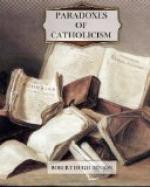First, undoubtedly, He was hated for His Holiness. Who can doubt that the terrific standard of morality which He preached—the Catholic preaching of which also is one of the charges of the Pagan—was a principal cause of His rejection. For it was He, after all, who first proclaimed that the laws of God bind not only action but thought; it was He who first pronounced that man to be a murderer and an adulterer who in his heart willed these sins; it was He who summed up the standard of Christianity as a standard of perfection, Be you perfect, as your Father in Heaven is perfect; who bade men aspire to be as good as God!
It was His Holiness, then, that first drew on Him the hostility of the world—that radiant white-hot sanctity in which His Sacred Humanity went clothed. Which of you convinceth me of sin?... Let him that is without sin amongst you cast the first stone at her! These were words that pierced the smooth formalism of the Scribe and the Pharisee and awoke an undying hatred. It was this, surely, that led up irresistibly to the final rejection of Him at the bar of Pilate and the choice of Barabbas in His place. “Not this man! not this piece of stainless Perfection! Not this Sanctity that reveals all hearts, but Barabbas, that comfortable sinner so like ourselves! This robber in whose company we feel at ease! This murderer whose life, at any rate, is in no reproachful contrast to our own!” Jesus Christ was found too holy for the world.
But He was found, too, not holy enough. And it is this explicit charge that is brought against Him again and again. It was dreadful to those keepers of the Law that this Preacher of Righteousness should sit with publicans and sinners; that this Prophet should allow such a woman as Magdalen to touch Him. If this man were indeed a Prophet, He could not bear the contact of sinners; if He were indeed zealous for God’s Kingdom, He could not suffer the presence of so many who were its enemies. Yet He sits there at Zacchaeus’ table, silent and smiling, instead of crying on the roof to fall in; He calls Matthew from the tax-office instead of blasting him and it together; He handles the leper whom God’s own Law pronounces unclean.
III. These, then, are the charges brought against the disciples of Christ, as against the Master, and it is undeniable that there is truth in them both.
It is true that the Catholic Church preaches a morality that is utterly beyond the reach of human nature left to itself; that her standards are standards of perfection, and that she prefers even the lowest rung of the supernatural ladder to the highest rung of the natural.
And it is also true, without doubt, that the fallen or the unfaithful Catholic is an infinitely more degraded member of humanity than the fallen Pagan or Protestant; that the monumental criminals of history are Catholic criminals, and that the monsters of the world—Henry VIII for example, sacrilegious, murderer, and adulterer; Martin Luther, whose printed table-talk is unfit for any respectable house; Queen Elizabeth, perjurer, tyrant, and unchaste—were persons who had had all that the Catholic Church could give them: the standards of her teaching, the guidance of her discipline, and the grace of her sacraments. What, then, is the reconciliation of this Paradox?




